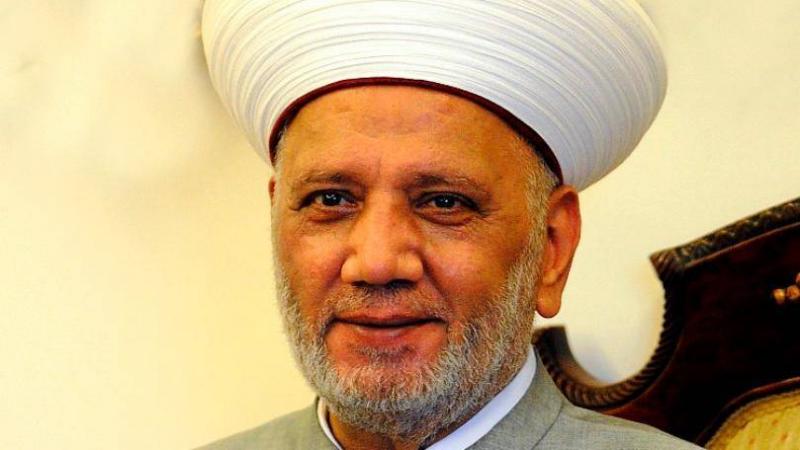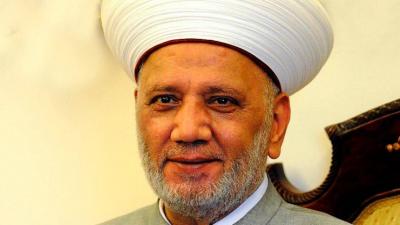The Grand Mufti of the Lebanese Republic, Sheikh Abdul Latif Deryan, stated during a celebration at the Shiite Council on the occasion of the first anniversary of the death of the President of the Supreme Shiite Islamic Council, Sheikh Abdul Amir Qabalan: "When we talk about national unity, we are talking about the noble Imam Abdul Amir Qabalan. And when we talk about Islamic unity, we are also talking about the noble Imam Abdul Amir Qabalan. He accumulated, may God have mercy on him, the intellectual conclusions reached by his two predecessors, the late Imam Musa al-Sadr and the scholar and jurist, Muhammad Mahdi Shams al-Din."
He added, "Thus, the Supreme Shiite Islamic Council remained a higher council, upholding the banner of national unity, working to make the unity of Muslims the cornerstone of this unity. This has been, and still is, and will remain, a noble goal, the noble goal of the Dar al-Fatwa, the Supreme Shiite Islamic Council, the Druze community, and the Alawite Islamic Council. For this reason, the (Islamic Spiritual Summit) body, which includes the four Islamic authorities (Sunnis, Shiites, Druze, and Alawites), met to coordinate among themselves and to build bridges of understanding and cooperation with our partners in the homeland, from various sects and Christian churches. For this reason, our great late leader was keen on taking courageous initiatives to overcome the difficulties, or what seemed difficult, with a bright intelligent glance or a constructive idea."
He continued, "Imam Qabalan, may God rest his soul, did not believe in anything impossible in Islamic-Islamic relations or Islamic-Christian relations. The smile, to him, transformed the impossible into the possible. Obstacles were merely crossword puzzles for which he possessed the skill to decode their symbols with knowledge, logic, astute vision, calculation, faith, and a smile. To him, the impossible was merely a temporary obstacle that could be dissolved, or at least circumvented. With love, he would overcome obstacles and difficulties. With a smile, he built bridges of understanding and cooperation. Many times he succeeded in circumventing a general knot with a clever maneuver outside all calculations and expectations, transforming frowning obscurity into smiling clarity."
He stated, "In his leadership of the Supreme Shiite Islamic Council, as well as in his constructive interventions in Islamic-Islamic meetings and Islamic-Christian meetings, he appeared distinctive and exceptional in rounding sharp corners, bringing views closer, and extracting positives to build upon. There was nothing impossible for Imam Abdul Amir Qabalan, especially when it concerned Islamic-Islamic relations or Islamic-Christian relations. For him, every problem had a solution. Sometimes, his sincere inclinations and smile were the gateway to the solution, as knots unraveled, facial expressions softened, and tumultuous ideas found their way to common visions. Thus, the late Imam was a unique school of its kind in inclusive religious work and unified national work."
He added, "On the anniversary of his death, we miss the radiant smiling face. We miss his wisdom, sincerity, and honesty. We miss his absolute faith in the ability to correct deviations, round sharp corners, and carve out paths for constructive and joint work."
He continued, "Lebanon suffers from various crises, countless in number, and there is a serious effort from the designated president to form a government that confronts this difficult phase Lebanon is going through, carving out solutions to pull the country out of this dark tunnel we have long been in. This task is not the sole responsibility of the government; it is also a responsibility for all political forces that have participated and continue to participate in managing the various state facilities, making it easier for the government to implement solutions by providing it with the necessary support and positive stances to pursue the right path. Instead of everyone cooperating around this goal, we sadly find some emerging from here and there, with discordant voices and stances leaning towards discomfort, complicating matters further, and increasing the misery and suffering of the Lebanese people, as if this people is not from their kin, nor are their children their own, nor is their fate theirs. This people entrusted them with its confidence and entrusted them with the responsibility of leading the nation, yet they have led it towards a precipice that could fall at any moment."
He said, "We want a government that revitalizes this oppressed people, and it is unacceptable for officials to drag them down into a deep abyss of hell where the vast majority of Lebanese are burned by the fire, having lost what they earned throughout their lives, and their children who the homeland has lost—human wealth upon which the promising future of Lebanon that we wanted stands. Dealing positively with the formation of the government helps the designated president in its formation, not in its obstruction, which has negative repercussions on everyone without exception. We must reaffirm that the formation of the government is a demand of all Lebanese. If the government is not formed, we fear something worse than our current situation, especially as we face the obligation of electing a new president of the republic. If we cannot form a government, how will the situation be concerning the election of a new president?"
He added, "Beware of reaching a presidential vacuum; this event—like the formation of the government—has substantial efforts being made today. Addressing these two mandates is more than necessary for the state to remain and endure, and to save the Lebanese who are experiencing the worst phase they have ever faced since the birth of Greater Lebanon."
He continued, "Electing a president of the republic is an important requirement; he is the head of the state and should be a unifying and inclusive reference for all Lebanese. What is required is consensus and agreement to ensure the election process, for Lebanon is a consensus country, and a vacuum is a disaster for Lebanon and the Lebanese. Our role is to be cautious and vigilant to avoid reaching an undesirable outcome, and what happened in the past regarding the presidential vacuum must not be repeated, for what could happen might be even worse. Today is not like yesterday; everything has changed in this regard, and we must realize this truth and work all together to achieve government formation and the election of a new president for all Lebanese."
He concluded, "The Dar al-Fatwa has sought and continues to seek to unify the word and the Lebanese ranks, and we must not forget that Lebanon is surrounded by many dangers and threats. The only way for its salvation is through solidarity, awareness, wisdom, and understanding, which are capable of warding off danger from Lebanon and making it a strong barrier against all malicious enemies."
"May God have mercy on our great deceased Imam Abdul Amir Qabalan. On the anniversary of his death, we turn to God the Almighty, asking Him to embrace him with His vast mercy and to reward him well for what he did and contributed. The best he left us is knowledge and a distinctive approach in moderation, tolerance, Islamic and national unity, and love for the good of all people."




